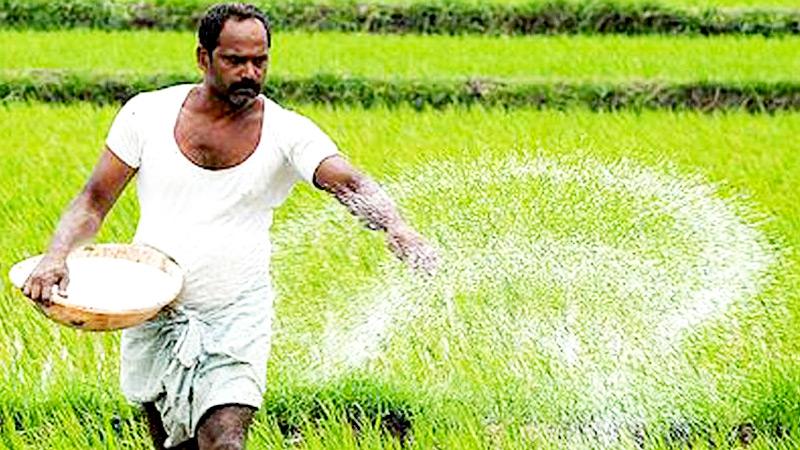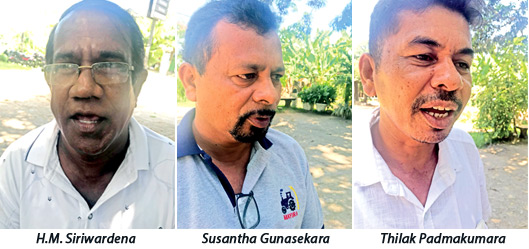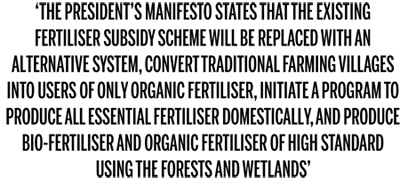
The debate on the government’s decision to ban chemical fertiliser, pesticides and weedicides, in a bid to curtail spending on imports and promote organic fertilizer, has gained intensity as famers around the country prepare for a low harvest in the Maha Season.
 Acknowledging that the decision taken on April 27 was not a popular one, the government nevertheless goes ahead with the plans despite the uproar, reiterating that this is for long-term benefits of the country.
Acknowledging that the decision taken on April 27 was not a popular one, the government nevertheless goes ahead with the plans despite the uproar, reiterating that this is for long-term benefits of the country.
Sri Lanka spends about US $ 500 million annually on chemical fertiliser importation while excessive use has resulted in sickness and environmental pollution.
Concerns
In Sri Lanka, there were several concerns in the past few months about the quality of food we consume, chemicals we add during food preparation including the quality of oil. With the government’s ban on palm oil recently, many industries were affected. However, this saw a surge in local products such as coconut oil, with many households opting to produce their own oil for consumption, leading to better nutrition and healthier lifestyles.
 Similarly, along with other import products, turmeric was also banned, leading to a shortage in the beginning. However, as local production picked up, turmeric is now available in the market without the government having to meet demands through imports.
Similarly, along with other import products, turmeric was also banned, leading to a shortage in the beginning. However, as local production picked up, turmeric is now available in the market without the government having to meet demands through imports.
The ban on chemical fertiliser is yet another move in this wholesome effort to make Sri Lanka self-sufficient again, to reduce spending on imports and recreate the prosperity that we once enjoyed as a nation during the ancient times.
Yet, it takes a lot of effort, patience and many a stumbling block to achieve what the government aims for.
Gal Oya project
The Gal Oya project in Ampara is one of the areas that has a large cultivation population.
The area now has the third generation of farmers, cultivating over 68,000 hectares during the Maha Season and producing over 300,000 metric tons of paddy.
As farmers prepare for the Maha Season, they now face a new worry with the ban on chemical fertiliser. For years, they have been used to chemical fertiliser, risking their lives and the lives of others for the sake of reaping a better harvest. However, they now prepare ‘for the worst’.
“As a Sri Lankan, I think this is a good move for the country. However, this is a hasty decision and we are unprepared,” said Thilak Padmakumara, a third generation farmer of the Gal Oya project.
“For generations, we have been used to chemical fertiliser. When this is suddenly banned, there should have been a system to introduce alternatives. I have to start the Maha season soon and I have no expectations for a good harvest.”
“Usually, I reap 80 bushels of paddy during one season. But now with the new situation, I don’t think I can reap even 40 bushels in the Maha Season.
Alternatives are not given. Carbonic fertiliser is not available. I have to start preparing for the season in August. The agriculture officials give us advice on the use of organic fertiliser, but we don’t have time to prepare all this,” the farmer said.
Lost hopes
Upali Rajapksa, a second generation farmer who has been cultivating paddy for over 20 years voiced similar concerns although he added that this move is a positive one for the country.
However, he said the time given for the farmers to prepare for this is not sufficient and that he had lost all hopes for a profitable income.
“We were provided with the training and necessary advice but we don’t have time to produce organic fertiliser,” Rajapaksa said.
Although farmers seem lost without alternatives, agricultural officials say that they have given farmers enough advice over the years to adopt to healthier and better agricultural practices.
In addition, this is not a sudden decision as the vision for a ‘revolution in the use of fertiliser’ was strategised in President Gotabaya Rajapaksa’s manifesto - Saubagyaye Dekma (Vistas of Prosperity and Splendor).
The President’s manifesto states that “the existing fertiliser subsidy scheme will be replaced with an alternative system, convert traditional farming villages into users of only organic fertiliser, initiate a program to produce all essential fertiliser domestically, and produce bio-fertiliser and organic fertiliser of high standard using the forests and wetlands.”
Susantha Gunasekara, an Agriculture Inspector in Ampara said the government has taken a very important and timely decision amid many difficulties. However, with the decision to ban all chemicals, it is inevitable that farmers face low outputs in the next few months until they pick up alternative agricultural practices.
Advice and training
“Farmers are used to commercial agriculture rather than subsistence agriculture. They are used to large incomes in a short period. Cultivation is done with hybrid seeds which respond well to chemical fertiliser that yield a bountiful harvest as opposed to heirlooms. We have met local demands so far.
This could change in the immediate future. Due to Covid-19, agriculture worldwide has taken a blow and importing essential foods could be a problem. It is true that we don’t have enough carbonic fertiliser to meet demands. So farmers need to make use of all the knowledge we have given them so far,” he said.
Gunasekara added that cultivation seasons have been introduced considering the pest invasions in various periods of the year. By avoiding these periods, farmers’ need for pesticides is minimal. At other times, they need to make their own solutions according to the training and advice given, he said.
“Although the knowledge was made available to farmers, they are reluctant to spend time to make their products when they could go to a shop and buy the necessary chemicals in five minutes.
They need to change their attitudes towards agriculture. Earlier, only a handful of farmers would come to our trainings. Now we see an increase in the number of farmers seeking advice, which is a positive trend,” Gunasekara added.
H. M. Siriwardena, Paddy Cultivation Officer, Agriculture Office of Ampara also agreed that attitudinal change is key to face the perceived crisis.
Towards self-sufficiency
“In the past, farmers never used chemicals in their fields. They were used to traditional agricultural practices such as using cattle that had a reciprocal relationship with the farmer.
Cattle provide the manure to the fields while they plough. The hay was used to fertilise the fields. The soil had the necessary nutrients as well as the insects and other arthropods beneficial to the soil. Nowadays, farmers opt for machines. They depend on chemical fertiliser which does not make the soil nutritious and destroy all beneficial insects. They do not see the value in hay and discard it.
With fertiliser subsidies from the government, the farmer doesn’t see the need for carbonic fertiliser nor the importance of technical knowledge on agriculture. So we keep making multi-national companies richer,” Siriwardena added.
Siriwardena added that importing carbonic fertiliser is not recommended. “This could cause a serious hazard to our soil bringing harmful weeds, insects and fungi with it,” he stressed. He added, however, that the government’s effort is commendable and benefits the country in the long run.
As an answer to the speculations and concerns over imported carbonic fertiliser, Co-Cabinet Spokesperson Minister Keheliya Rambukwella said in a news conference that the requirement for the Maha Season will be imported while adhering to all quarantine rules and regulations.
“The government has taken measures to implement a testing mechanism via three research institutes to test samples of organic fertiliser imported to the country,” he said.
History has proven that it is through challenges that victory could be achieved. In this present scenario, the perceived unconquerable hurdle can be overcome only with the right mindset and correct attitudes.
Although it seems difficult to fathom at present, in the future, Sri Lankans could one day be proud of the demand for its new label that says the produce is not only Sri Lankan but 100 percent organic too.
